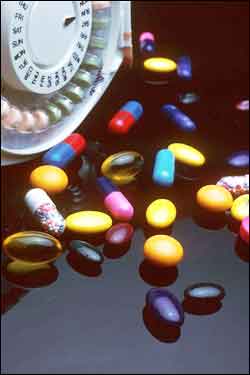Nevirapine is better than efavirenz at raising ’good’ cholesterol

Two of the most commonly prescribed drugs for treating HIV (antiretroviral drugs)–nevirapine and efavirenz–can both raise levels of the “good type” of cholesterol (HDL cholesterol), but nevirapine raises it higher than efavirenz, according to a new study by van Leth and colleagues published in the launch issue of PLoS Medicine. “These data suggest that nevirapine may be preferable to efavirenz in HIV-infected adults who have increased cardiovascular risk,” says Andrew Carr, an HIV specialist at St. Vincent’s Hospital in Sydney, Australia, who was not involved in the study. Cardiovascular risk factors include high blood pressure, diabetes, and smoking, which put patients at higher risk of heart disease and stroke.
However, perceived cardiovascular risk is only one factor that would affect the choice between these two drugs, notes Carr. Efavirenz is thought to be marginally better than nevirapine at keeping HIV infection under control; efavirenz is also advantageous because patients only need to take it once a day, whereas nevirapine must be taken twice daily. The new study “moves clinicians and patients away from ’one-size-fits-all antiretroviral therapy,’” says Carr, allowing them to weigh up the different advantages and disadvantages of each drug.
In the study, the researchers compared the cholesterol levels in 417 patients with HIV who were taking nevirapine against 289 patients who were taking efavirenz. None of the patients had been on any antiretroviral drugs before. Patients taking nevirapine had a significantly larger increase in HDL cholesterol compared with patients taking efavirenz.
Although the increase was higher with nevirapine, this does not prove that nevirapine is better at reducing the risk of heart disease and strokes, says Carr. The researchers did not look at the risk of these diseases in their study.
Praphan Phanuphak, of the Thai Red Cross AIDS Research Center in Bangkok, Thailand, who was one of the authors of the study, says that the findings are particularly important for treating HIV in the developing world. “Nevirapine is much cheaper, particularly in developing countries where generic drugs are available,” says Phanupak. “In many developing countries, nevirapine is incorporated in fixed dose combination with other drugs such as stavudine and lamivudine which costs only US$1 per day.”
Media Contact
All latest news from the category: Health and Medicine
This subject area encompasses research and studies in the field of human medicine.
Among the wide-ranging list of topics covered here are anesthesiology, anatomy, surgery, human genetics, hygiene and environmental medicine, internal medicine, neurology, pharmacology, physiology, urology and dental medicine.
Newest articles

High-energy-density aqueous battery based on halogen multi-electron transfer
Traditional non-aqueous lithium-ion batteries have a high energy density, but their safety is compromised due to the flammable organic electrolytes they utilize. Aqueous batteries use water as the solvent for…

First-ever combined heart pump and pig kidney transplant
…gives new hope to patient with terminal illness. Surgeons at NYU Langone Health performed the first-ever combined mechanical heart pump and gene-edited pig kidney transplant surgery in a 54-year-old woman…

Biophysics: Testing how well biomarkers work
LMU researchers have developed a method to determine how reliably target proteins can be labeled using super-resolution fluorescence microscopy. Modern microscopy techniques make it possible to examine the inner workings…





















